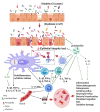Are Fermented Foods Effective against Inflammatory Diseases?
- PMID: 36767847
- PMCID: PMC9915096
- DOI: 10.3390/ijerph20032481
Are Fermented Foods Effective against Inflammatory Diseases?
Abstract
Fermented foods have been used over the centuries in various parts of the world. These foods are rich in nutrients and are produced naturally using various biological tools like bacteria and fungi. Fermentation of edible foods has been rooted in ancient cultures to keep food for preservation and storage for a long period of time with desired or enhanced nutritional values. Inflammatory diseases like rheumatoid arthritis, osteoarthritis, and chronic inflammatory pain are chronic disorders that are difficult to treat, and current treatments for these disorders fail due to various adverse effects of prescribed medications over a long period of time. Fermented foods containing probiotic bacteria and fungi can enhance the immune system, improve gastrointestinal health, and lower the risk of developing various inflammatory diseases. Foods prepared from vegetables by fermentation, like kimchi, sauerkraut, soy-based foods, or turmeric, lack proper clinical and translational experimental studies. The current review has focused on the effectiveness of various fermented foods or drinks used over centuries against inflammation, arthritis, and oxidative stress. We also described potential limitations on the efficacies or usages of these fermented products to provide an overarching picture of the research field.
Keywords: arthritis; fermented food; fermented vegetables; inflammation; pain.
Conflict of interest statement
The authors declare no conflict of interest.
Figures



Similar articles
-
Microbial Ecology of Fermented Vegetables and Non-Alcoholic Drinks and Current Knowledge on Their Impact on Human Health.Adv Food Nutr Res. 2019;87:147-185. doi: 10.1016/bs.afnr.2018.09.001. Epub 2018 Dec 7. Adv Food Nutr Res. 2019. PMID: 30678814 Review.
-
Bioactivity of soy-based fermented foods: A review.Biotechnol Adv. 2019 Jan-Feb;37(1):223-238. doi: 10.1016/j.biotechadv.2018.12.001. Epub 2018 Dec 4. Biotechnol Adv. 2019. PMID: 30521852 Review.
-
The health benefits of fermented fruits and vegetables and their underlying mechanisms.Compr Rev Food Sci Food Saf. 2024 Nov;23(6):e70072. doi: 10.1111/1541-4337.70072. Compr Rev Food Sci Food Saf. 2024. PMID: 39611544 Review.
-
Lacto-Fermented Fruits and Vegetables: Bioactive Components and Effects on Human Health.Annu Rev Food Sci Technol. 2025 Apr;16(1):289-314. doi: 10.1146/annurev-food-052924-070656. Epub 2025 Jan 13. Annu Rev Food Sci Technol. 2025. PMID: 39805038 Review.
-
Fermented Foods in the Management of Obesity: Mechanisms of Action and Future Challenges.Int J Mol Sci. 2023 Jan 31;24(3):2665. doi: 10.3390/ijms24032665. Int J Mol Sci. 2023. PMID: 36768984 Free PMC article. Review.
Cited by
-
Relationship between dietary live microbe intake and the prevalence of COPD in adults: a cross-sectional study of NHANES 2013-2018.BMC Pulm Med. 2024 May 9;24(1):225. doi: 10.1186/s12890-024-03045-2. BMC Pulm Med. 2024. PMID: 38724980 Free PMC article.
-
The impact of regular sauerkraut consumption on the human gut microbiota: a crossover intervention trial.Microbiome. 2025 Feb 12;13(1):52. doi: 10.1186/s40168-024-02016-3. Microbiome. 2025. PMID: 39940045 Free PMC article. Clinical Trial.
-
Relationship Between Fermented Food Consumption Patterns, hs-CRP, and Chronic Diseases Among Middle-Aged Koreans: Data from the 2015-2018 Korea National Health and Nutrition Examination.Nutrients. 2025 Apr 14;17(8):1343. doi: 10.3390/nu17081343. Nutrients. 2025. PMID: 40284207 Free PMC article.
-
Nutritional Strategies for Chronic Craniofacial Pain and Temporomandibular Disorders: Current Clinical and Preclinical Insights.Nutrients. 2024 Aug 27;16(17):2868. doi: 10.3390/nu16172868. Nutrients. 2024. PMID: 39275184 Free PMC article. Review.
-
Administration of turmeric kombucha ameliorates lipopolysaccharide-induced sepsis by attenuating inflammation and modulating gut microbiota.Front Microbiol. 2024 Aug 30;15:1452190. doi: 10.3389/fmicb.2024.1452190. eCollection 2024. Front Microbiol. 2024. PMID: 39282561 Free PMC article.
References
-
- Hasan M.N., Sultan M.Z., Mar-E-Um M. Significance of fermented food in nutrition and food science. J. Sci. Res. 2014;6:373–386. doi: 10.3329/jsr.v6i2.16530. - DOI
-
- Blandino A., Al-Aseeri M.E., Pandiella S.S., Cantero D., Webb C. Cereal-based fermented foods and beverages. Food Res. Int. 2003;36:527–543. doi: 10.1016/S0963-9969(03)00009-7. - DOI
-
- Varzakas T., Zakynthinos G., Proestos C., Radwanska M. Fermented vegetables. In: Yildiz F., Wiley R.C., editors. Minimally Processed Refrigerated Fruits and Vegetables. Springer; Boston, MA, USA: 2017. pp. 537–584.
Publication types
MeSH terms
LinkOut - more resources
Full Text Sources

